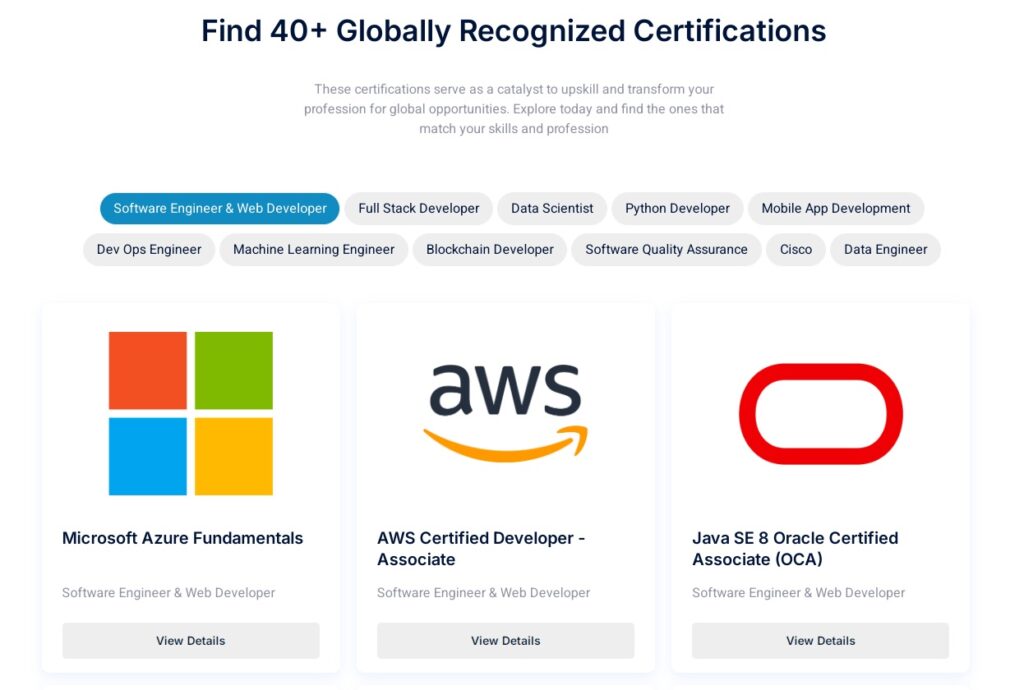
In today’s rapidly advancing tech-driven world, acquiring professional certifications has become a necessity for IT professionals seeking to enhance their skills and boost their careers. Many governments around the world, alongside leading tech companies, offer online certificates for roles like Software Engineer, Full Stack Developer, Data Scientist, and others. These programs are essential in equipping individuals with industry-relevant skills, ensuring they remain competitive in a dynamic job market. In this article, we will explore the key areas of IT expertise, the types of certifications available, and the benefits of government-backed and company-paid certificates.
| Join WhatsApp | Click Here |
| More Govt Jobs | Click Here |
| International Job/Visa | Click Here |
| Make Money At Home | Click Here |
| Subscribe YouTube | Click Here |
| Click Here | |
| Click Here |
Contents
- 1 Key IT Career Roles and Skills
- 1.1 1. Software Engineer & Web Developer
- 1.2 2. Full Stack Developer
- 1.3 3. Data Scientist
- 1.4 4. Python Developer
- 1.5 5. Mobile App Developer
- 1.6 6. DevOps Engineer
- 1.7 7. Machine Learning Engineer
- 1.8 8. Blockchain Developer
- 1.9 9. Software Quality Assurance
- 1.10 10. Cisco Certified Professionals
- 1.11 11. Data Engineer
- 2 Government and Company-Sponsored Certifications
- 2.1 1. Microsoft Azure Fundamentals
- 2.2 2. AWS Certified Developer – Associate
- 2.3 3. Java SE 8 Oracle Certified Associate (OCA)
- 2.4 4. IBM DevOps and Software Engineering Professional
- 2.5 5. Prometheus Certified Associate (PCA)
- 2.6 6. Microsoft Azure Developer Associate
- 2.7 7. Google Professional Cloud Developer
- 2.8 8. AWS Cloud Practitioner
- 2.9 9. Certified Data Scientist Certification
- 2.10 10. PCEP – Certified Entry-Level Python Programmer
- 2.11 11. Coursera Specializations
- 3 Benefits of Certifications
- 4 Conclusion
Key IT Career Roles and Skills
1. Software Engineer & Web Developer
Software Engineers design, develop, and maintain software systems, while Web Developers focus on building websites and web applications. Key skills include coding, problem-solving, and familiarity with programming languages like JavaScript, HTML, CSS, and frameworks like Angular or React.
2. Full Stack Developer
Full Stack Developers are proficient in both front-end and back-end development. They handle everything from UI/UX design to database management, and their skill set includes languages like JavaScript, Python, and Ruby, as well as frameworks such as Django and Node.js.
3. Data Scientist
Data Scientists analyze vast amounts of data to provide insights, predictions, and solutions for businesses. Their toolkit includes programming languages like Python or R, statistical models, machine learning techniques, and tools like TensorFlow, Apache Spark, and Hadoop.
4. Python Developer
Python Developers specialize in writing applications and software using Python, a versatile and widely used programming language. From web development to automation, Python’s simplicity makes it a favorite among developers.
5. Mobile App Developer
Mobile App Developers create apps for iOS and Android devices. These professionals need to be proficient in programming languages like Swift for iOS and Kotlin for Android, along with understanding mobile development frameworks.
6. DevOps Engineer
DevOps Engineers bridge the gap between development and operations, focusing on automating and streamlining processes. They use tools like Docker, Jenkins, and Kubernetes to ensure smooth software delivery.
7. Machine Learning Engineer
Machine Learning Engineers specialize in creating algorithms that enable machines to learn and make decisions. Their expertise includes Python, TensorFlow, PyTorch, and machine learning models for predictive analytics and AI development.
8. Blockchain Developer
Blockchain Developers create decentralized applications and smart contracts using blockchain technology. Their knowledge spans cryptography, distributed systems, and platforms like Ethereum and Hyperledger.
9. Software Quality Assurance
Software QA Engineers are responsible for testing and ensuring software quality. Their skill set includes automated testing tools like Selenium, TestNG, and familiarity with Agile and Scrum methodologies.
10. Cisco Certified Professionals
Cisco certifications are critical for network engineers and administrators. Skills gained include networking, security protocols, and troubleshooting through hands-on experience with routers, switches, and firewalls.
11. Data Engineer
Data Engineers build the infrastructure for data generation, storage, and analysis. They work with databases, big data tools, ETL (extract, transform, load) processes, and cloud platforms to manage and optimize data pipelines.

Government and Company-Sponsored Certifications
Several government programs and renowned companies offer online certificate programs to help professionals advance in these fields. Here are some notable certifications offered by major companies, many of which are government-recognized and eligible for funding or scholarships:
1. Microsoft Azure Fundamentals
This certification introduces individuals to the basic concepts of cloud computing, services provided by Microsoft Azure, and fundamental cloud principles.
2. AWS Certified Developer – Associate
Amazon Web Services (AWS) offers this certification to equip developers with knowledge of cloud-based applications, deployment, debugging, and designing on AWS.
3. Java SE 8 Oracle Certified Associate (OCA)
A highly regarded certification from Oracle, which validates an individual’s knowledge of Java programming and foundational skills for software development.
4. IBM DevOps and Software Engineering Professional
IBM offers this program to help IT professionals learn key DevOps practices, automation, and the software engineering lifecycle, ensuring proficiency in continuous integration and delivery (CI/CD).
5. Prometheus Certified Associate (PCA)
Prometheus, a leading tool for system monitoring and alerting, offers this certification to validate expertise in setting up and using the platform.
6. Microsoft Azure Developer Associate
This certification focuses on those looking to specialize in Azure’s services and products, covering development, testing, and troubleshooting on the platform.
7. Google Professional Cloud Developer
Google Cloud’s certification for developers covers building highly scalable applications on Google’s cloud infrastructure and managing cloud services.
8. AWS Cloud Practitioner
The AWS Cloud Practitioner certification is a foundational credential for individuals with little or no experience with cloud computing, offering insights into the AWS platform and cloud technologies.
9. Certified Data Scientist Certification
This certification validates an individual’s ability to manage data, perform analysis, and develop data-driven solutions using various tools and techniques.
10. PCEP – Certified Entry-Level Python Programmer
Python Institute offers this entry-level certification, which is ideal for those beginning their Python programming journey, covering basic coding, data types, and syntax.
11. Coursera Specializations
Coursera, in partnership with universities and tech companies, provides certifications in various IT fields, including Machine Learning, AI, Software Development, and more. Many of these programs are backed by government agencies or available with financial aid.

Benefits of Certifications
Obtaining a certification in the IT industry provides numerous benefits:
- Enhanced Knowledge: Certifications validate a professional’s expertise and keep them updated on the latest tools, technologies, and practices.
- Career Advancement: With the right certification, IT professionals can move into higher-paying roles or specialized positions.
- Global Recognition: Many certifications, particularly from companies like AWS, Microsoft, and Cisco, are recognized globally, opening doors to international job opportunities.
- Improved Job Security: Certified professionals are often seen as more reliable and knowledgeable, making them less vulnerable to layoffs.
- Government Support: Several governments sponsor or provide financial assistance for certification programs, especially for individuals in emerging fields like cybersecurity, AI, and cloud computing.
Conclusion
With the growing demand for tech professionals across various industries, certifications offer a viable way for individuals to gain the skills and recognition needed to succeed. From government-backed programs to paid certifications from tech giants like Microsoft, AWS, and IBM, there are numerous opportunities for professionals to advance in their careers. Whether you’re a Software Engineer, Full Stack Developer, Data Scientist, or aspiring DevOps Engineer, obtaining an online certification can help unlock new career possibilities and keep you competitive in the global job market.

Say Job City in Pakistan for today latest jobs opportunities in private and Govt departments. View all new Government careers collected from daily. sayjobcity.com